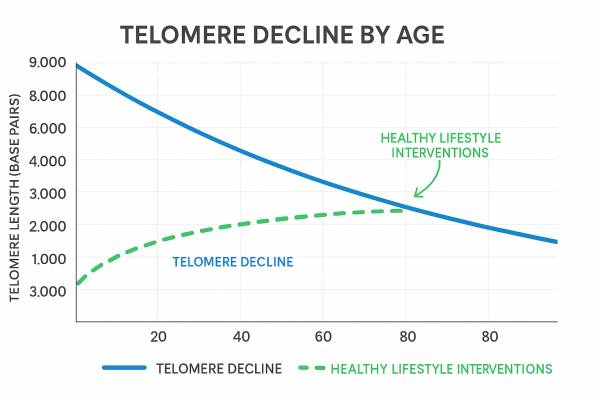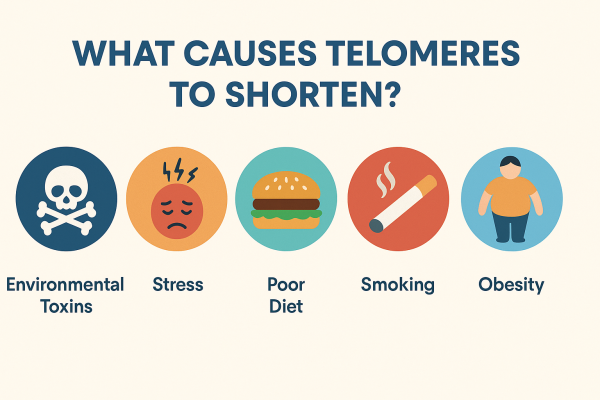

By Dr. Justin Marchegiani
Telomeres—tiny protective caps on the ends of your chromosomes—may hold the secret to a longer, healthier life. While you can’t stop the biological clock, you can slow it down. Understanding how telomeres work and how lifestyle choices impact them gives you the power to preserve your DNA’s integrity and your body’s vitality.
In this article, we’ll dive into telomeres, what shortens them, and functional medicine strategies you can implement to help protect them and extend your lifespan.

Telomeres are the protective DNA sequences at the ends of chromosomes, similar to the plastic tips on shoelaces that prevent fraying. They serve a vital function: shielding chromosomes from damage during cell division.
A small portion of telomere DNA is lost each time a cell divides. Over time, telomeres become shorter, and the cell can no longer divide when they reach a critically short length. This cellular senescence is a major driver of aging and age-related diseases.
Newborns typically have telomeres measuring between 8,000 to 13,000 base pairs.
Adults lose about 20–40 base pairs each year.
By age 40, the average person has lost around 1,600 base pairs.
Shortened telomeres are associated with heart disease, diabetes, cancer, cognitive decline, and premature aging. The good news is that lifestyle choices can slow and, in some cases, even reverse telomere shortening.

Exposure to air pollution, industrial chemicals, household toxins, and synthetic fragrances can dramatically accelerate telomere attrition. For instance, research shows that traffic police officers exposed to vehicle emissions have significantly shorter telomeres than office workers in the same city.
How to protect your telomeres:
Use non-toxic cleaning and personal care products.
Avoid synthetic air fresheners and fragrances.
Install high-quality HEPA air filters at home and work. (See recommended filters here.)
Stress is a silent telomere killer. Women who experienced long-term caregiving stress were found to have telomeres that were the biological equivalent of 10 years older than non-stressed peers.
Stress increases cortisol, reducing antioxidant levels and DNA damage through oxidative stress. This makes telomere deterioration faster and more pronounced.
Stress-reduction techniques:
Practice mindfulness, breathwork, or meditation daily.
Try grounding (barefoot walking on natural surfaces).
Journal or talk to a friend regularly.
Prioritize 7–8 hours of restorative sleep.
Diets lacking antioxidants and essential nutrients can shorten telomeres through oxidative stress. High-sugar, inflammatory diets filled with processed foods have been shown to damage DNA and reduce telomere length.
Animal studies also show that calorie restriction can preserve telomere integrity and extend lifespan by up to 66%.
Nutrition tips for healthy telomeres:
Eat a diet rich in antioxidant-rich fruits, vegetables, and herbs (e.g., berries, turmeric, green tea).
Consider intermittent fasting or time-restricted eating to activate anti-aging pathways like autophagy.
Follow a paleo or keto diet with clean, organic protein, healthy fats, and low-glycemic carbohydrates.
Smoking is one of the fastest ways to age your DNA. A person who smokes a pack of cigarettes daily loses an additional five base pairs per year, totaling an average of 7.4 years of biological aging over a 40-year smoking span.
If you smoke, take action:
Start a cessation program immediately.
Work with a functional medicine doctor to address nicotine withdrawal, adrenal imbalances, and oxidative stress.
Use herbal support to detoxify the lungs and liver.
Obesity is strongly associated with shortened telomeres, often more severely than smoking. Excess fat increases oxidative stress and inflammation, accelerating DNA damage and biological aging.
One study found that obesity was equivalent to nearly 9 years of lost telomere length.
Lifestyle shifts that make a difference:
Begin a functional fitness routine (walking, strength training, yoga, or swimming).
Optimize macronutrients to reduce insulin resistance.
Address root causes like gut imbalances, adrenal fatigue, and thyroid dysfunction with lab testing.

A root-cause functional medicine approach provides insight into what’s accelerating your aging process—and how to intervene. Consider these key tests:
Oxidative Stress Markers: To assess DNA damage and inflammation.
Micronutrient Testing: To identify vitamin and mineral deficiencies critical to DNA repair.
Adrenal Cortisol Rhythm (DUTCH Test): To monitor cortisol dysregulation caused by chronic stress.
Telomere Length Testing: Direct measurement of biological age, available through specialty labs.
Advanced Inflammatory Markers: Like hsCRP, homocysteine, and fibrinogen, which can correlate with telomere shortening.
Once we assess these imbalances, we create a personalized plan that includes nutrition, supplements, detoxification, and lifestyle changes to support cellular health and longevity.
👉 Click here to schedule your free consultation with Dr. Justin Marchegiani and begin your telomere-protective functional medicine journey today.
Every choice you make influences your biological age. Here’s a daily checklist to support your telomeres:
✅ Eat antioxidant-rich whole foods
✅ Avoid processed sugar and artificial ingredients
✅ Incorporate intermittent fasting or smaller portions
✅ Filter your air and reduce chemical exposures
✅ Prioritize deep, restorative sleep
✅ Move your body with low-impact, enjoyable exercise
✅ Manage stress with rituals that calm your nervous system
✅ Stay hydrated and support detoxification pathways
The goal isn’t perfection—it’s consistency. Even minor improvements in your daily routine can result in years of additional healthy life.
References
Epel, E. S. et al. (2004). Accelerated telomere shortening in response to life stress. PNAS. https://doi.org/10.1073/pnas.0407162101
Valdes, A. M. et al. (2005). Obesity, cigarette smoking, and telomere length in women. Lancet. https://doi.org/10.1016/S0140-6736(05)66630-5
Tucker, L. A. (2017). Physical activity and telomere length in U.S. men and women. Preventive Medicine. https://doi.org/10.1016/j.ypmed.2017.07.022
Hou, L. et al. (2012). Air pollution exposure and telomere length in highly exposed workers in China. Occupational and Environmental Medicine. https://doi.org/10.1136/oemed-2011-100593
Lee, J. et al. (2010). Dietary patterns and telomere length in women. The American Journal of Clinical Nutrition. https://doi.org/10.3945/ajcn.2010.29807
====================
Recommended Products
====================
IN CASE YOU MISSED IT:
The Dirty Dozen: Top Toxic Ingredients to Avoid in Personal Care Products